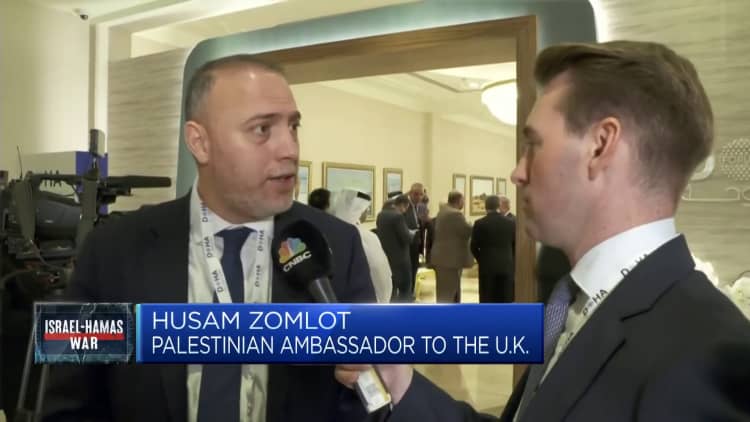Palestinians are inspecting the debris at the Jaffa Mosque, which was hit by an Israeli bombardment, in Deir el-Balah, in the central Gaza Strip, on December 8, 2023, amid continuing battles between Israel and Hamas. (Photo by Majdi Fathi/NurPhoto via Getty Images)
Nurphoto | Nurphoto | Getty Images
Palestinian officials expressed resounding disappointment after the United States vetoed a United Nations resolution calling for an immediate humanitarian cease-fire in Gaza.
“It was the U.S. who failed the Palestinians,” Palestinian Ambassador to the United Kingdom Husam Zomlot told CNBC’s Dan Murphy on the sidelines of the Doha Forum in Qatar on Sunday. “The U.S. has stood between humanity and peace and security.” The White House did not immediately respond to a CNBC request for comment.
The U.S. on Friday vetoed a U.N. Security Council draft resolution that was backed by 13 Security Council members, while the United Kingdom abstained. The vote came about after U.N. Secretary-General Antonio Guterres invoked Article 99 of the U.N. charter to coalesce the 15-nation council to address the crisis in the Gaza Strip.
UN Secretary-General Antonio Guterres speaks during a United Nations Security Council meeting on Gaza, at UN headquarters in New York City on December 8, 2023.
Yuki Iwamura | AFP | Getty Images
Mohammad Shtayyeh, prime minister of the Palestinian Authority, echoed the disappointment on Sunday, describing the result as “sad” and a “shame.”
“One hundred and more countries have called for an end to the atrocities. Only one single country did not like that and vetoed the situation. I think this is not wise, this is not acceptable,” he said.
The internationally recognized Palestinian Authority administered the Gaza enclave before the shock win of Hamas in the elections of 2006. It now has limited oversight of the occupied West Bank.

The veto was not a move that was a bolt out of the blue, Sanam Vakil, Chatham House’s Middle East North Africa program director, told CNBC on Monday at the same forum in Doha.
“Knowing the strength of the U.S.-Israeli relationship, it’s not surprising. The U.S. has decided to give Israel a longer leash to meet its war aims,” she said.
“At this point, those war aims are very high, trying to decapitate Hamas’ leadership. And that’s certainly coming at the expense of Palestinian people.”
Not a surprising move
The Gaza Strip has been the epicenter of heavy bombardment, after Israel launched retaliatory airstrikes for the unprecedented terror attack by Palestinian militant group Hamas on Oct. 7. Following the assault by Hamas that killed some 1,200 people and took more than 240 hostages, U.S. President Joe Biden flew to Israel in a show of solidarity, pledging billions of dollars in military support. Multiple other high-profile U.S. officials have since visited Israel to liaise with the government of Prime Minister Benjamin Netanyahu, with U.S. Secretary of State Antony Blinken carrying out several trips.
US President Joe Biden (L) listens to Israel’s Prime Minister Benjamin Netanyahu as he joins a meeting of the Israeli war cabinet in Tel Aviv on October 18, 2023, amid the ongoing battles between Israel and the Palestinian group Hamas.
Brendan Smialowski | Afp | Getty Images
Washington’s backing of Israel — politically, financially and militarily — has been a longstanding pillar of its Middle East foreign policy. Israel is also the largest recipient of American foreign aid in the world, with the U.S. providing Israel with $3.1 billion in military aid annually.
Both the U.S. and Israel oppose the cease-fire as they believe it will only benefit Hamas, allowing it to regroup and carry out fresh incursions. The U.S. supports pauses in fighting — but has increasingly called on Israel to minimize civilian casualties. The Israel Defense Forces say they do not outright target noncombatants, accusing Hamas of entrenching its operation bases and underground tunnel networks in the vicinity of civilian sites.

“While the U.S. strongly supports a durable peace in which both Israel and Palestine can live in peace and security, we do not support calls for an immediate cease-fire,” Robert Wood, deputy U.S. ambassador to the U.N., said after the decision.
“This would only plant the seeds for the next war, because Hamas has no desire to see a durable peace, to see a two-State solution.”
A seven-day pause in fighting — which allowed for an increase in humanitarian aid delivered and distributed in the Gaza Strip and the release of some hostages captured by Hamas and detainees held by Israel — ended on Dec. 1, with hostilities resuming heatedly since.
Officials at the Hamas-run health authority say the death toll in the Gaza Strip has surpassed 17,900 in the weeks since the Hamas terror attacks. Around 1.9 million residents of the enclave have been displaced.
— CNBC’s Natasha Turak contributed to this report.
Credit: Source link













